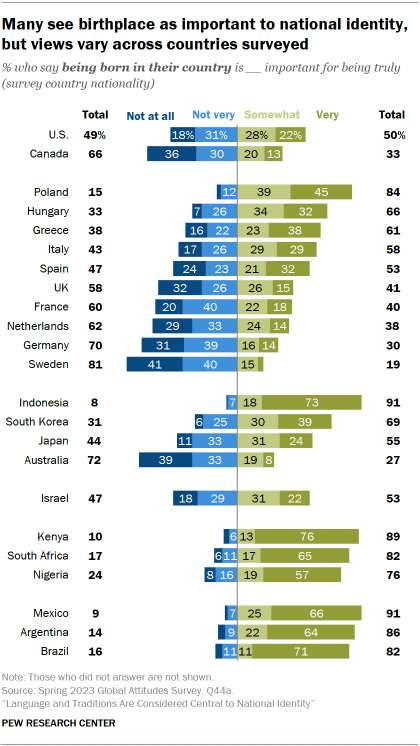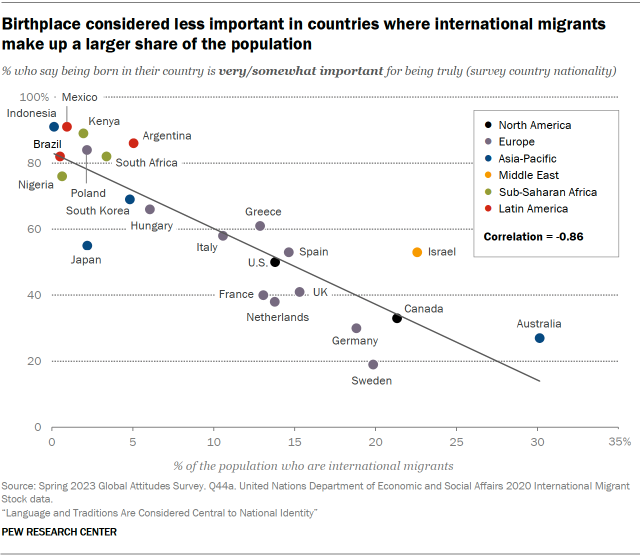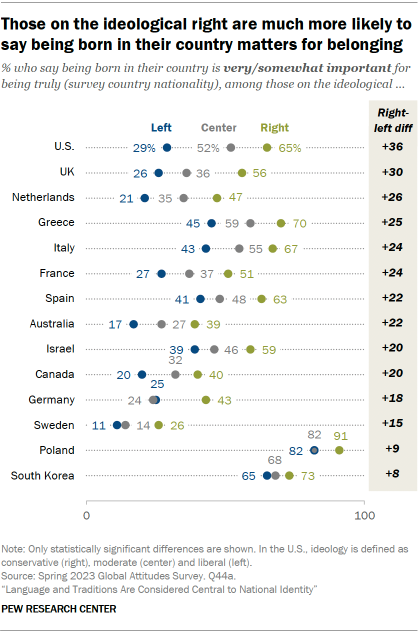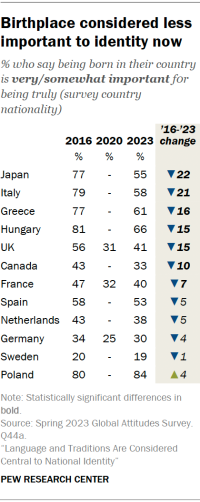On balance, respondents tend to see being born in their country as an important part of national identity. However, views vary widely across the 23 countries surveyed.

Majorities in just over half of the countries consider being born there meaningful to national identity. Sentiments in Indonesia, Kenya and Mexico are especially strong, with around nine-in-ten saying being born in their country is important for true belonging. In fact, two-thirds or more cite birthplace as a very important factor of national identity in these countries.
Those in middle-income nations (Argentina, Brazil, Indonesia, Kenya, Mexico, Nigeria and South Africa) are especially likely to say being born in their country is very important: A median of 66% say this across the seven middle-income countries surveyed. Overall, nations with lower GDP per capita tend to place greater importance on birthplace as a key element of national identity.
However, not all feel that birthplace is an important aspect of nationality: Majorities in about a third of the countries surveyed say birthplace is not important. Swedes are the most likely to express this view, with 81% saying being born in Sweden is not very or not at all important for being truly Swedish. In Israel, Spain and the U.S., people say this is and is not important in about equal measures.
Migrant populations and the importance of birthplace
Nations where immigrants make up a smaller share of the population tend to see birthplace as a more important component of national identity, and countries with a greater share of immigrants are more willing to accept those born outside of the country as true nationals.

In Indonesia and Mexico, for example, where 91% say being born in the country is important for true belonging, immigrants make up less than 1% of the population. Conversely, immigrants make up about a fifth of the population in Canada, where only 33% consider birthplace important to being truly Canadian.
Who is most likely to see birthplace as important to national identity?

When thinking about the importance of birthplace, there are stark divisions along ideological lines. In almost all the countries where we asked about respondents’ ideological affiliations, birthplace is much more important to those on the right than on the left. Large double-digit differences exist in 12 countries.
Ideological differences are particularly wide in the U.S., where about two-in-three conservatives say being born in the U.S. is important to being truly American, compared with less than three-in-ten liberals who say the same.
Age also plays a role: In about half the countries surveyed, older adults are more likely than younger adults to cite birthplace as an important component of national identity. In Japan, for example, 61% of adults ages 40 or older believe it is important for being truly Japanese, while only 36% of adults ages 18 to 39 say the same.
Views on this question are also tied to religious identity. In most countries, those who identify as part of the primary religion are somewhat more likely than those who don’t to consider birthplace important. This contrast is most visible in Greece, where members of the primary religion – Christians – are more than twice as likely as non-Christians to say birthplace is important (66% vs. 32%).
In around two-thirds of the countries surveyed, birthplace tends to be more important to both lower-income individuals and those with less education.
Changes in views over time

Shifts in opinions are mixed, since this question was last asked in 2020 in some countries and 2016 in others. However, there are a few notable exceptions:
- Since 2016, Japanese and Italians have become 22 and 21 percentage points less likely, respectively, to say being born in their country matters. Significant decreases also occurred in Canada, France, Greece, Hungary and the UK.
- This question was asked again in 2020 in France, Germany and the UK. In all those nations, the share of the public who believe it is important to be born in the country has increased somewhat over the past three years.




